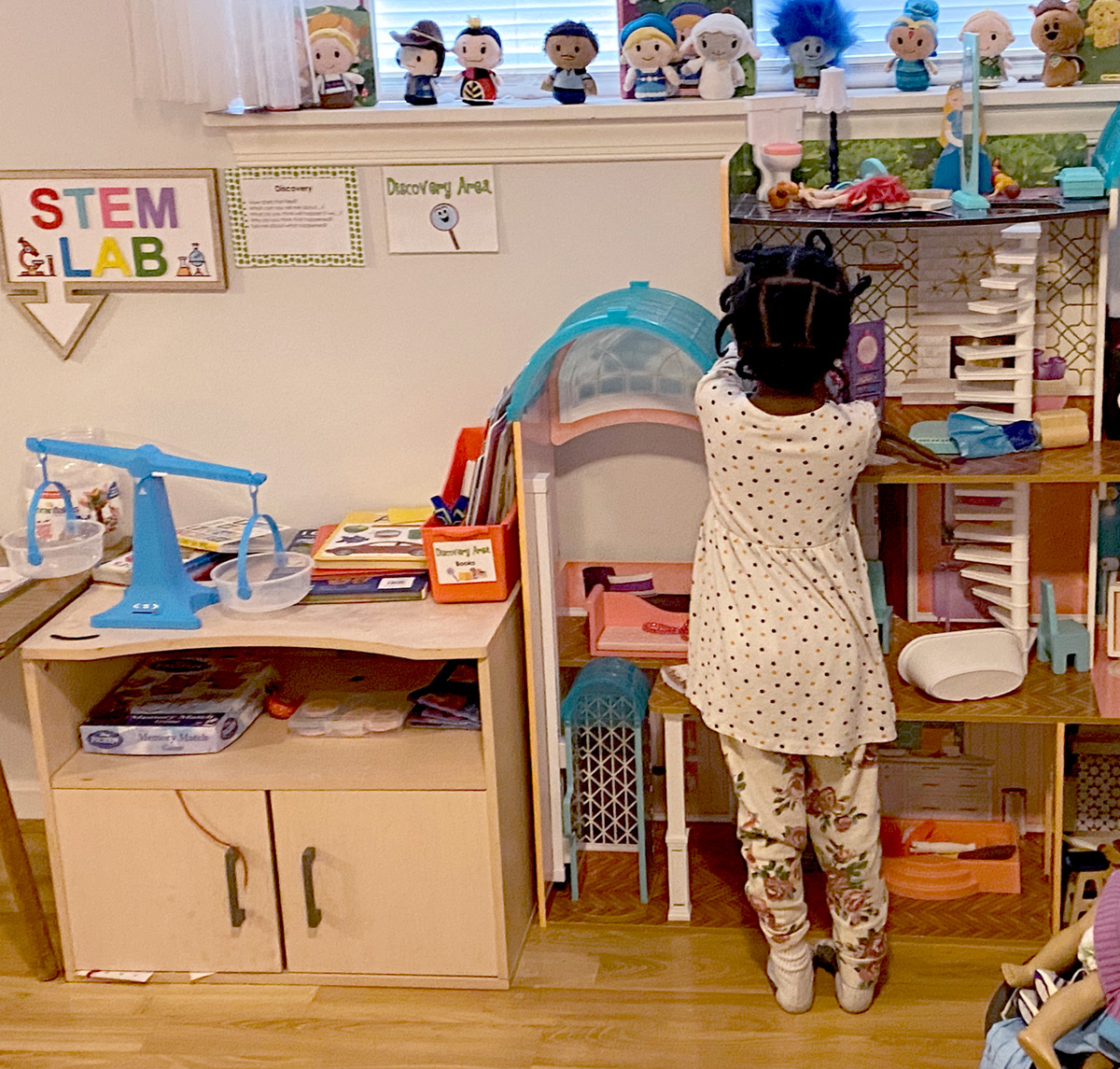Having eyes in the back of your head isn’t in the job description, but it sure helps. One twin is grumpily sitting out yoga because it’s the other’s turn to be the “teacher.” A one-year-old toddles at the margins of the room, swinging a toy keyboard over his head, while the expression on a two-year-old’s face suddenly, subtly indicates that it’s time for a potty break.
Over the course of any given day, Tiffany Jones manages all of these situations and a hundred more. Drawing upon her knowledge of child development, she recognizes and addresses diverse learning styles and abilities, cultivating a sense of belonging and curiosity within her program. “I see them growing into a generation of confident, empathetic and capable individuals,” she states.
As owner and operator of Precious Moments Family Childcare, Jones educates eight children in two large rooms of her home in Rockville, Md. And if it weren’t for American Rescue Plan Act (ARPA) funding, this dedicated and talented educator might have gone out of business, leaving the parents of these children unable to keep their jobs. And Precious Moments certainly wouldn’t be in these bright, capacious rooms without ARPA dollars.
Jones has plans for improving her business if and when more public investment comes—including a better outdoor space and a greater capacity to accommodate families who cannot normally afford child care—but first she has to make sure nobody swallows a Lego.
Jumping through Hoops
Originally from Bowie, Md., Jones aspired to be a doctor before motherhood and economics nudged her onto another career path. Enrolling in the rigorous pre-professional program in early care and education at Washington Adventist University meant bringing her three children along with her from 6:00 p.m. to 10:00 p.m. four nights a week.
“I had to learn the business and jump through all those hoops,” she recalls. Her administrative skills came in handy during the pandemic, when she secured ARPA funding to relocate Precious Moments. It cost $8,000 to move three blocks away and to furnish the new site. The rent is higher here, but it allows her to have separate areas for living and working.
“I was closed for 18 months during the pandemic,” she recalls, “So the funding had to last to pay the living expenses of a single mom to three kids.”
 When a facility closes, she adds, it cannot open the next day in the new location, owing to licensing and fire marshal certification. “It was really closer to two years from when I closed to when I reopened and was fully operational. The parents were like, ‘We need this place and you need to open.’”
When a facility closes, she adds, it cannot open the next day in the new location, owing to licensing and fire marshal certification. “It was really closer to two years from when I closed to when I reopened and was fully operational. The parents were like, ‘We need this place and you need to open.’”
Since the pandemic, and thanks to ARPA funding, the racial makeup of Jones’s class transformed. “For 15 years,” she says, “I didn’t have one Black client. Child care is very expensive, and in Rockville it’s just really hard to find high-quality, affordable care. But when I started to accept pre-K funds, that was the first time that I had a client of color.”
The expanded space she secured helped her qualify for the pre-K expansion funds. On the day I visited, Margie Ryan, the pre-K coach assigned to Jones by the Family Child Care Alliance of Maryland, was there to observe class. (Read about Maryland’s Prekindergarten Expansion Grant Program.) “Tiffany is way ahead of the game,” Ryan told me, praising her vocabulary-building games centered on everyday household objects. Jones serves on the board of the Montgomery County Children’s Opportunity Alliance and received a Montgomery County Innovative Leadership Excellence Award in October 2023.
Erica Phillips, executive director at the National Association for Family Child Care (NAFCC), praises Jones for “taking full advantage of ARPA to upgrade her program.” Thanks to the pre-K expansion and other factors, Phillips explains, Precious Moments is a more sustainable business today, which matters for Jones and her family, for the families she supports and for the local employers and economy that rely on her. Jones is the Maryland State Representative for NAFCC as well as an NAFCC policy fellow.
Jones’s financial situation is far from unique. “I know lots of providers that have used the ARPA funding,” she says, “and that’s what sustained their business.” Obstacles to receiving money included not having a separate bank account for their business or not having sufficient English-language skills to navigate the application. Montgomery County, Md., (where I live, too) has an unusually robust Resource and Referral Center that helped providers with the process.
Beyond Precious Moments
Having learned to advocate for herself, Jones has proven effective at advocating for family care educators in Maryland. According to Phillips, “Peer leaders like Tiffany were incredible in disseminating information during the pandemic. Our child care leaders really stepped up, sharing information and making sure that no family child care program was left behind.”
 Last year, care providers successfully lobbied Montgomery County to pilot a program for wellness benefits, including access to mental health counseling. A new goal on the horizon is what Jones describes as “a shared services model, where we’re all in a consortium of sorts to get access to benefits.” The vision includes business coaching, bulk purchasing and child care management software.
Last year, care providers successfully lobbied Montgomery County to pilot a program for wellness benefits, including access to mental health counseling. A new goal on the horizon is what Jones describes as “a shared services model, where we’re all in a consortium of sorts to get access to benefits.” The vision includes business coaching, bulk purchasing and child care management software.
As Phillips points out, most family child care providers don’t have the means to save for retirement. Jones opened a self-employed pension at her credit union, but it is on her to make contributions to it. Given her slim profit margins, the account’s growth is slower than she would like.
What does the future hold for Precious Moments? “Any kind of funding would be helpful,” Jones says. “That outdoor classroom would be at the top of my list.” She also mentions curriculum upgrades, wraparound supports for her families and a backstop for her constant cash flow problem.
“I could resolve the cash flow issue by taking all privately paying families who pay before care is given,” Jones notes, “but then I wouldn’t be able to help families that really need care in order to work their jobs, and are looking for high-quality early education.”
Support for this reporting was provided by the Better Life Lab at New America.

Mark Swartz
Mark Swartz writes about efforts to improve early care and education as well as developments in the U.S. care economy. He lives in Maryland.



